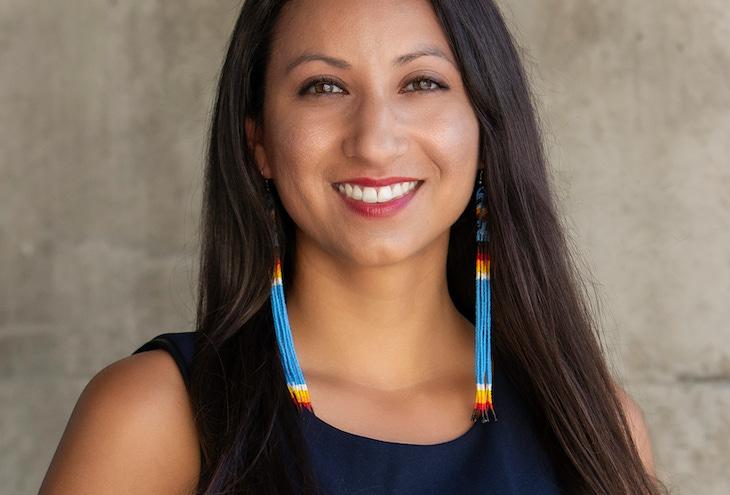Connecting the dots among tribal lands, government agencies, and entities interested in tribal land resources is at the heart of what drives Dr. Lydia Jennings. In 2020 she completed her PhD in soil microbiology with a minor in American Indian policy at the University of Arizona. Dr. Jennings, Pascua Yaqui, is currently pursuing a post-doctoral fellowship in community, environment, and policy at the university’s College of Public Health.
For Dr. Jennings, connection to the land is deeply rooted in her Indigenous heritage. Growing up in Santa Fe, N.M., she attended the Native American Preparatory School, where she developed an appreciation for her ancestral lands. There she also had the opportunity to spend her junior year in Spain, followed by her senior year in Hawaii, experiences that inspired Dr. Jennings to think about ancestral lands in a broader context.
She earned an associate's degree from Cabrillo College in Santa Cruz County, Calif., and her BS in environmental science, technology, and policy from California State University, Monterey Bay. As an undergraduate, Dr. Jennings had the opportunity to conduct research both in the field and in the lab. “I learned pretty quickly that I preferred working in the field as opposed to instrumentation testing indoors,” she recalls. Before starting her PhD program, Dr. Jennings also worked as an environmental toxicologist, where she saw a variety of communities combating water pollution.
Research for her doctorate reflects her connection to the land. An enthusiastic trail runner, she often ran through portions of the Sonoran Desert, where she saw abandoned mines and other evidence of mining activity. “Learning how I could support Indigenous nations on the front lines where mining occurs became my focus,” says Dr. Jennings.
Her dissertation, “Reclaiming Mining in Southern Arizona: Considering Science and Policy Aspects that Build Resiliency,” looked at how Indigenous knowledge was considered during the tribal consultation process for a proposed copper mining site on National Forest lands that the Tohono O’odham, Pascua Yaqui, and Hopi tribes hold sacred. “There’s the component of Indigenous data governance and how to use state and mining industry data while considering Indigenous data to determine if a mine should move forward,” she explains. “Tribal nations are often respected for their capacity to restore lands after mining, but how is Indigenous knowledge respected when community experts are highlighting an area not to mine?” Government agencies have data about tribal lands, which Dr. Jennings says can guide tribal leaders and students in ways that preserve or restore the integrity and sacredness of the ecosystems. “The data within these agencies needs to be made available to the tribes,” she says, “and tribes need to have authority on what data they want to share.”
In March 2021, Dr. Jennings underscored her connection to Native lands when she plotted a 50-mile fundraising run along the Arizona Trail, an 800-mile recreational trail that consists of Indigenous trading routes between Utah and Mexico. Her goal was to highlight achievements by Indigenous STEM scholars — naming one for each mile — while marking her personal milestone of earning a doctorate. COVID-19 had cancelled her much-anticipated graduation ceremony, and an ultra-run could serve as a similarly epic marker of all she had achieved.
Dr. Jennings chose her culturally significant route — which may be impacted by a proposed mine — based on her doctoral research. She wanted to honor the land she studied in the most intimate way she knows: through her footsteps and prayers. She was inspired by former high school teacher and cross-country coach Edison Eskeets, whose own run through the Four Sacred Peaks benefited a scholarship fund. Similarly, Dr. Jennings’ run provided scholarships for future Indigenous scholars by raising money for the AISES Together Towards Tomorrow Fund.
Dr. Jennings completed the run in 11-and-a-half hours in a single day. The run — and the motivation that kept her going — was recorded in the documentary Run to Be Visible, produced by Patagonia and available on YouTube. “At each mile I completed, I thought deeply about each scholar I was honoring, and the nations behind them,” she says. “Running 50 miles was the perfect parallel to the journey of completing my PhD — a solo journey but one filled with support and inspiration from my nation, other Indigenous scholars, and future generations. When I finished, I was filled with emotion and gratitude for all those who have come before me, and all those who will follow.”
Dr. Jennings’ support for the AISES mission is grounded in her own experience with the organization, where she has been a member since 2014. “I felt a close connection to other Native STEM scholars at the National Conference,” she says. “That support is so important, especially when figuring out a career path. It’s very helpful to see other Natives already having successful careers and who can advise you on navigating next steps.”
The youngest of five children, Dr. Jennings also found inspiration in her family. Her grandfather, a lifelong gardener, shared his passion for the land. Her stepdad, a master gardener, developed a rainwater harvesting system, and her mother, a family therapist, shared her tribal traditions. “I took an appreciation for our natural resources and tribal knowledge and applied them to my educational and career pursuits,” she says. “Our elders earned their PhD through experience, and I was fortunate enough to learn from them.”













